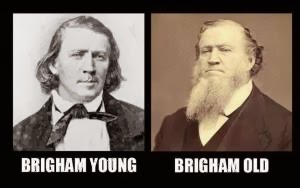
(Photo courtesy Wikimedia Commons)
Students with fake beards rode bikes around BYU last month to petition the Honor Code rule that prohibits beards. Honor Code policy states that male students are to be clean-shaven, excepting only mustaches as long as they are trimmed above the mouth. While most students accept and follow this rule, others bear grudges or find questionable means to grow approved beards. BYU issues beard waivers to certain individuals for various reasons, including medical concerns or or if a waiver applicant has a bearded part in a play or movie.
The reason for the rule? “Modesty and cleanliness are important values that reflect personal dignity and integrity, through which students, staff, and faculty represent the principles and standards of the Church,” according to the Honor Code website.
In a town that would achieve full Fleet Foxes-level “hipsterdom” if its student residents only had the facial hair to show it, the question rises about if the beard rule is misguided or from another time. Such a question is open for discussion on this forum, but some of the following conflicts will hopefully be helpful, if not interesting. Although few would go so far as to contend whether BYU can enforce this rule, these Supreme Court cases should affirm this right without any doubt.
A policeman in 1976 petitioned his county’s grooming rule all the way through to the Supreme Court in Kelley v. Johnson, claiming that it unconstitutionally deprived him of his liberty. As pertaining to men’s hair, the rule is the same as BYU’s: no beards, no goatees, no hair beyond the collar, only mustaches trimmed above the upper lip. The court decided that the right of personal appearance for a policeman did not supersede the state government’s interest in prohibiting certain kinds of appearances, i.e. beards. Additionally, the court made it clear that as long as the rule provides any rational interest, there’s no questioning it.
Of course, policemen are in a different position from students. They are often required to wear uniforms and to refrain from public smoking and active participation in political affairs. By nature of their public office, the police never had much of a claim to personal appearance rights. Standard citizens, like BYU students, assume more of a right to personal appearance. That is, until they consent to a private institution’s grooming standards.
However, part of the argument goes that the ban on beards is antiquated. So, if a 1976 case seems similarly antiquated, is it still relevant? Although it’s hard to argue that it isn’t without arguing that the Supreme Court only rules according to cultural norms rather than the Constitution, there is a much younger, fresher case — one that hasn’t been decided yet.
Just one week ago, at the beginning of the new term, the U.S. Supreme Court heard oral arguments for Holt v. Hobbs, an issue of a Muslim inmate who is challenging an Arkansas state prison rule that bans beards longer than one-quarter inch. The challenge is rooted in the petitioner’s religious objections. Arkansas, on the other hand, states that it has an interest in keeping prisons safe, for long beards are capable of hiding contraband.
This interest would be compelling if we were talking about Dumbledore-size beards, but we’re not — any beard longer than one-quarter inch must be trimmed down. Then again, prisoners seem capable of hiding contraband in the darndest of places. Additionally, the court may consider legislatures as the only institution capable of specifying the exact length at which beards pose a significant safety concern, meaning it would only have the power to strike down or uphold the total ban.
The biggest difference between BYU and Holt — as well as BYU and Kelley — is that Holt is restrained by the state, whereas students are restrained by a private school. This is probably why no one disputes whether or not BYU is able to have a ban. Still, what an interesting comparison! For Holt, it is a religious objection that challenges the rule; for BYU, religion is the reason for the rule. At the very least, it can be said that the rule is based on standards of morality, according to the Honor Code statement.
Of course, hardly any of this speaks to whether BYU should have the rule, only that it can have the rule. Just some food for thought.




